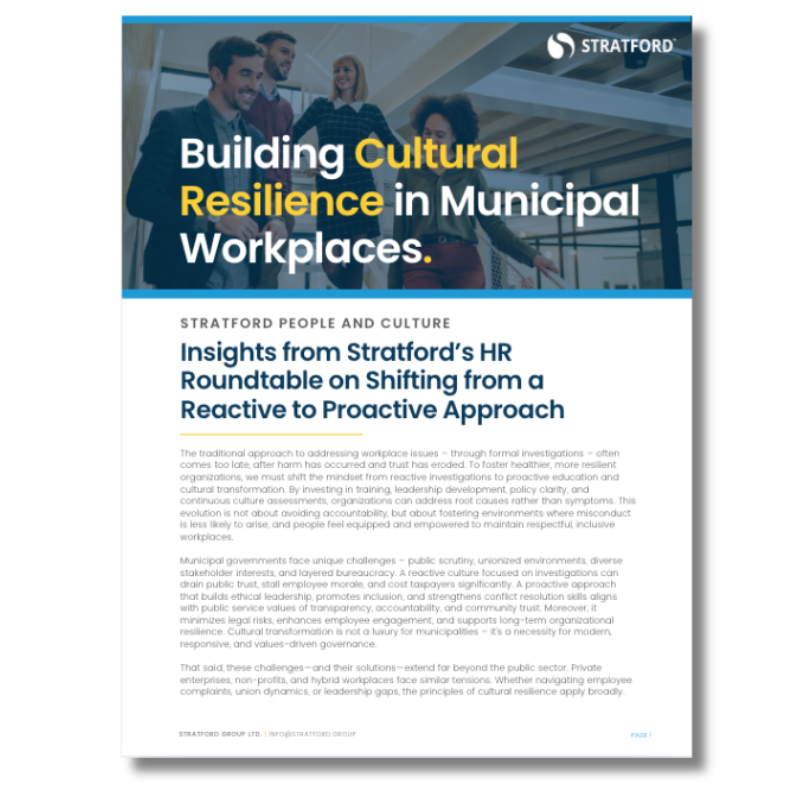Building Cultural Resilience in Municipal Workplaces
Insights from Stratford’s HR Roundtable on Shifting from a Reactive to Proactive Approach
Reactive workplaces are costing you more than just time.
Formal investigations will always have a place. But when they become the default response to conflict, it’s often a sign of deeper cultural dysfunction—where trust has eroded, leaders feel under-equipped, and informal resolution feels out of reach.
To foster healthier, more resilient organizations, we must shift from reaction to prevention—building cultures where conflict is addressed early, relationships are prioritized, and leadership is ready for complexity.
This is the focus of Stratford’s latest HR Roundtable:
Building Cultural Resilience in Municipal Workplaces
From the Front Page:
The traditional approach to addressing workplace issues—through formal investigations—often comes too late, after harm has occurred and trust has deteriorated.
To change this, organizations must invest in leadership development, clear policies, inclusive training, and continuous culture assessment. The goal isn’t to avoid accountability—it’s to foster environments where issues are less likely to arise, and teams are empowered to maintain respectful, inclusive workplaces.
Municipal governments face particularly complex challenges: public scrutiny, layered bureaucracy, union relationships, and high stakeholder visibility. A reactive culture drains morale and trust, while a proactive one builds ethical leadership and long-term resilience.
But these lessons apply far beyond the public sector. The principles of cultural resilience—early intervention, trust-building, and leadership capacity—are essential in private companies, nonprofits, and hybrid work environments alike.
About the Roundtable
This article draws on Stratford Group’s inaugural HR Roundtable, which convened senior municipal HR leaders from across Canada to explore one critical question:
How do we reduce our reliance on investigations and create workplaces resilient to conflict?
The group shared insights on leadership readiness, early intervention, union relationships, trust repair, and proactive HR strategy. Though focused on municipalities, the insights are sector-agnostic. The future of conflict resolution lies not only in policy—but in people, relationships, and the culture they co-create.
To promote open dialogue, all contributions have been anonymized. Stratford extends sincere thanks to each participant for their candour, courage, and leadership.
The below is a preview of what was shared.

Interested in the Full Article?
✓ A deeper exploration of each section
✓ Practical insights to help shift from reactive to proactive culture management.
✓ A bonus list of actionable takeaways for organizations facing grievances or investigations.
The Problem with a Reactive Culture
When formal complaints become the go-to mechanism for surfacing conflict, organizations lose the opportunity to address root causes early. An investigation-first culture often reflects deeper leadership and communication gaps.
→ Investigations, when overused, become a symptom—not a solution
→ Many formal complaints could be resolved earlier through coaching or dialogue
→ HR burnout and employee disengagement rise in reactive environments
“We were receiving a policy violation almost weekly—across transit, public works, paramedics. It wasn’t localized, which told us this wasn’t just about supervision. It was cultural.”
“Let’s not just train people to recover—we need to build their ability to anticipate and address issues early. It’s about readiness, not just response.”
Introducing the Concept of Pre-Resilience
Leaders at the roundtable emphasized the importance of building readiness—not just recovery. Pre-resilience means equipping teams with the skills, habits, and values that allow conflict to be addressed constructively before escalation.
→ Teach leaders to intervene before issues escalate
→ Embed conflict resolution skills and cultural values into everyday habits
→ Shift from reactive repair to proactive preparation
Leadership Readiness and the Supervisor Gap
Many frontline leaders are promoted based on technical skill—but may lack the tools to lead people effectively. This leadership gap creates inconsistent conflict handling and an over-dependence on HR for resolution.
→ Promotion often overlooks leadership and relational competencies
→ Supervisors may avoid conflict or escalate prematurely
→ Micro-trainings and coaching help build confidence and cultural stewardship
“We ask our leaders to manage people without giving them the tools. The impact ripples throughout the organization—and HR can’t be everywhere.”
“Directors weren’t talking to managers. Managers weren’t talking to employees. We prioritized connection—and suddenly, tough conversations got easier.”
Rebuilding Relationships to Reduce Grievances
Strong relationships—not rules—form the foundation of resilient cultures. Leaders shared how building trust through human connection reduced formal grievances and encouraged informal resolution.
→ Strengthen union–management relationships through open communication
→ Normalize informal, early-stage problem solving
→ Rebuild psychological safety with post-conflict trust strategies
Investigations: Managing Outcomes and Communication
How an investigation ends is just as important as how it begins. Leaders shared the value of providing thoughtful closure, reintegration support, and team-wide healing after difficult events.
→ Offer appropriate closure to all involved—without compromising confidentiality
→ Support individuals and teams with reintegration or restoration pathways
→ Normalize follow-through and post-investigation care
“There’s no one-size-fits-all, but we’ve found that some level of closure—without full detail—goes a long way in rebuilding trust.”

Data and the Disconnect Between Perception and Reality
Leaders often believe their organizations are inclusive and open—until employee feedback says otherwise. Using data to surface these perception gaps is the first step; acting on it builds credibility.
→ Use audits, surveys, and third-party tools to uncover blind spots
→ Respond with humility, transparency, and a willingness to change
→ Show impact by closing the loop between feedback and action
Conclusion:
Municipal workplaces face distinctive pressures: union relationships, public accountability, political oversight, and often, resource constraints. But culture is a shared asset—and a shared responsibility.
We cannot investigate our way to a healthy culture. Resilience must be built long before crisis strikes.
In a time where conflict is increasingly complex and employee expectations are rising, that shift isn’t a luxury. It’s leadership.
Want the Full Article?
Inside, you’ll get:
→ A deeper exploration of pre-resilience, leadership readiness, and more.
→ Practical insights to help shift from reactive to proactive culture management.
→ A bonus list of actionable takeaways for organizations facing grievances or investigations.
→ An accessible download format—perfect to bring into your next meeting or read when the timing’s right.
Whether you lead in a municipal, nonprofit, or private setting, this whitepaper is designed to spark conversation—and action.